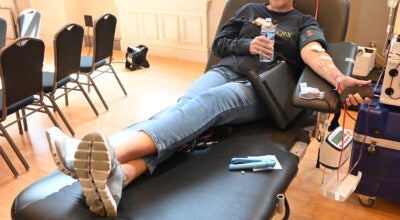Rowan Board of Health opposes ban on gas euthanasia
Published 12:00 am Tuesday, December 1, 2009
By Kathy Chaffin
kchaffin@salisburypost.com
The Rowan County Board of Health voted unanimously Tuesday night to go on record opposing state legislation banning the use of carbon monoxide “or any other gas” to euthanize cats and dogs.
As proposed, House Bill 6, known as the “Davie’s Law/Humane Euthanasia in Shelters Act,” would require all county animal shelters to use lethal injection to euthanize animals.
Health Department Director Leonard Wood said the bill remains in committee, along with a second ó House Bill 27, which bans carbon monoxide poisoning except in the case of wild animals ó and maybe a third.
There might also be similar legislation being considered in the Senate, he said.
Board of Health members also voted unanimously to authorize Wood and Chairwoman Barbara Andrews to send a letter to state legislators stating their opposition to House Bill 6 and similar legislation.
The Rowan County Board of Commissioners went on record March 2 opposing legislation banning carbon monoxide poisoning as a method of euthanization after N.C. Rep. Fred Steen asked for their position on the issue.
During discussion at the Board of Health meeting, board member Dan Mikkelson asked which of two recent opposing letters to the editor of the Salisbury Post was accurate. The first, written by Dr. Ashley Oliphant, a veterinarian in Cornelius, supported lethal injection, while the second, written by Jerry Dobbins of Mount Ulla, called Oliphant’s description of carbon monoxide euthanasia inaccurate and alleged organizations supporting legislation banning carbon monoxide are “radical animal rights groups.”
Mikkelson said the writers of both letters seemed very knowledgeable on the issue.
Dr. Luther Lyerly, the veterinarian on the board, said carbon monoxide poisoning, when done incorrectly, can be very painful for animals. But when done correctly, he said, it is approved by the American Veterinary Medical Association as a humane form of euthanasia.
Lethal injection, on the other hand, Lyerly said, can be harder on a feral animal than carbon monoxide poisoning because the animal has to be restrained before a lethal injection can be administered.
Lyerly said many of the animals being euthanized are not pets. “These are wild animals …” he said. “They don’t want human contact.”
Clai Martin, Animal Control supervisor for the county, has spoken against the legislation banning carbon monoxide euthanization at two state hearings. Many of the dogs and cats being euthanized in Rowan, he said, either can’t be controlled, have spent their lives on chains with little human contact or are feral without any human contact.
The draft of a letter from board members opposing House Bill 6 stated, “While no one wants to inflict undue pain or suffering upon animals, the health and safety of Rowan County’s Animal Shelter employees is of utmost concern and priority.”
Eliminating the use of carbon monoxide euthanization, the letter stated, “will place employees at risk of being seriously injured by feral and aggressive animals. It is understood that animal euthanasia is a controversial issue; however, common sense must prevail.”
Martin said the N.C. Veterinary Medical Association recently went on record opposing House Bill 6.
The proposed letter also addressed the increased cost legislation requiring lethal injection would bring to the county.
“It’s an unfunded mandate,” Martin told board members, “so my question is, who’s going to pay for this?”
Board member Rick Parker responded, “The state’s not going to pay.”
Last year in Rowan County, 5,498 cats and dogs were euthanized.
Euthanizing that many animals by lethal injection would be a lot to ask of staff, said board member Dr. Robert Tannehill.
Andrews said the lethal injection isn’t always as painless and quick as proponents claim, referring to her personal experience when she had a veterinarian euthanize a sick family pet. The cat suffered seizures before succumbing to the lethal injection, she said.
Lyerly agreed. “It doesn’t always go well,” he said.
Board members agreed with Mikkelson’s suggestion the draft of the letter be revised to include the positions of the American Veterinary Medical Association and the N.C. Veterinary Medical Association.
Mikkelson asked Wood if he could witness animals being euthanized in the carbon monoxide chamber to help him respond to citizens’ complaints.
Wood said he could and invited any other interested board members to join him. “I really think it’s probably a very good idea,” he said.
One issue that lethal injection proponents keep bringing up, Wood said, is that the law requires sick animals and animals under the age of 16 weeks to be euthanized by lethal injection.
While this is a recommendation, he said it is not a law. The Rowan Animal Shelter sedates animals that are sick or under 16 weeks of age before placing them in the chamber, he said, but they are all euthanized by carbon monoxide poisoning.
Wood said one county was sued for not using lethal injection to euthanize sick and young animals.
“There is the possibility that Rowan may be sued for that,” he said. “You just need to understand that.”
Parker said, “Face it. Anybody can sue anybody.”
Contact Kathy Chaffin at 704-797-4249.


